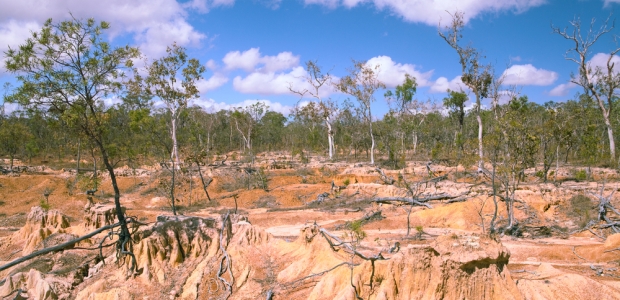
Report Warns of Arable Land Losses
The International Resource Panel's report says erosion, nutrient depletion, acidification, salinization, compaction and chemical pollution have left 33 percent of the world's soils moderately or highly degraded.
A new report released June 17 in Beijing at an event marking the World Day to Combat Desertification finds that the world's countries need to improve the way land is evaluated in order to unlock its true potential and reverse the alarming pace of land degradation, including the loss of 24 billion tonnes of fertile soil and 15 billion trees every year. The International Resource Panel's report says erosion, nutrient depletion, acidification, salinization, compaction and chemical pollution have left 33 percent of the world's soils moderately or highly degraded and, if current conditions continue, 320-849 million hectares of land will be converted to cropland by 2050 at the expense of the world's savannahs, grasslands, and forests, causing greenhouse gas emissions from agriculture to increase by 24-30 percent.
"Land potential evaluations must be completed and applied before changes in land use or management are implemented," according to the IRP, a consortium of 34 internationally renowned scientists, more than 30 national governments, and other groups hosted by the United Nations Environment Programme. "No farmer or nation can afford to invest in land management systems that ignore existing knowledge and information. Despite this, land conversions to a single crop and management system continue to occur across areas in which soil, topography, and sometimes climate conditions are so variable that failure across at least part of the project is virtually inevitable."
"To feed the world's people, we will need to get the best we can out of the land," said Ibrahim Thiaw, deputy executive director of UNEP. "But to make sure that we leave the environment in a healthy state, so that future generations can also feed their people, breathe clean air, build resilience to climate change, and use the resources nature provides to enrich their lives, we need to do the best we can for that land. The International Resource Panel, in this study of the benefits of land evaluation, has again shown us a way to do more and better with less, and, at the same time, deliver on the Sustainable Development Goals that the world agreed to last year."
The World Day to Combat Desertification also advocates for achieving the overall Sustainable Development Goals. The global observance event in Beijing was hosted by the State Forestry Administration of China. In 2013, China embarked on the new development strategy, "The Belt and Road," aiming to strengthen cooperation among countries primarily in Eurasia. Since then, it has been promoting green and low-carbon infrastructure construction in cooperation with the neighboring countries connected by the historic Silk Road. At the event, China announced the "One Belt and One Road Joint Action to Combating Desertification Initiative," together with interested countries and stakeholders.